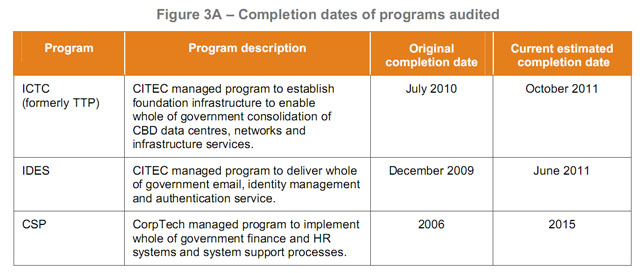Qld govt in IT go slow zone

Queensland's auditor-general has slammed the governance of three massive state government technology consolidation projects, pointing out that they have all substantially blown their time frames.

(Credit: Queensland auditor-general)
"Each program was delayed from its original completion date ... It should be noted that all of the programs have changed direction, scope and methods of delivery since inception — this has contributed significantly to the delays," wrote Qld Auditor-General Glenn Poole in a landmark report handed down today (PDF).
"The governance of investments at the program levels was insufficient to demonstrate that the delivery of benefits, including savings to government, was a key driver within the programs."
The three projects considered by the auditor-general — in a report that also damned the disastrous implementation of Queensland Health's new payroll system — included the state's ICT Consolidation Program (ICTC); the Identity, Directory and Email Services (IDES) project; and the Corporate Solutions Program.
The ICTC was a project established after the state's Service Delivery and Performance Commission handed down a report on ICT Governance in the state government in October 2006. Its aim was to establish a whole-of-government consolidation of CBD datacentres, networks and infrastructure services. It was initially managed by the state's Office of the Chief Information Officer, but then transitioned to be managed by government IT services provider CITEC in September 2009.
"In its current form, this program is not designed or structured to achieve full technology consolidation," the auditor wrote. "The direction of the current program was to implement infrastructure that would enable agencies to consolidate and rationalise their ICT environments at their own discretion.
One plus side is that the program is still substantially under ($12.17 million) its budget of $44 million. However, as at January 2010, there was "no method of identifying, recording, tracking and reporting demonstratable financial benefits" for the program.
The next project examined by the auditor-general, IDES, had the aim of delivering a whole-of-government email, identity management and authentication service, to be based on Microsoft Exchange and administered by CITEC and with a budget of $252 million over 10 years. Though again, it has suffered problems.
The project was expected to transition all existing agencies using Microsoft Exchange onto the new whole-of-government platform by December 2009 — 24 months after the project was initiated. But the date was extended to June 2011, after delays were experienced.
The implementation phase plan was originally expected to be completed and approved by December 2008, the report stated. "However, actual delivery of this milestone occurred on 18 September 2009." Again, the project was under budget so far.
The key problem with IDES appears to have been that there was "no program board with adequate stakeholder representation to drive the program forward and to deliver the outcomes and benefits", according to the report. CITEC was the only body involved in decisions about the program's schedule.
The third project the auditor-general examined, the Corporate Solutions Program or CSP, was established in August 2005 with the aim of implementing a whole-of-government finance and human resources solution. It had an initial capital budget of $125 million, which has since been revised progressively to $249 million.
IBM is the prime contractor on the project — but in September 2009, IBM's role was revised downwards — to solely include the replacement of Queensland Health's Lattice payroll system.
As at March 2010, the auditor-general wrote, some 12 implementations of the new finance system and one implementation of the HR system had been completed, with eight legacy SAP, four Aurion, three Lattice payroll and one "TSS" payroll systems were still to be migrated — in addition to CITEC's own in-house SAP and Aurion systems.
Out of all of the projects, it appears as though CSP has so far been the most successful — with the initial $100 million in projected savings expected to be achieved by 2012-2013. However, that doesn't count the public relations nightmare suffered by the Queensland Government over the botched Queensland Health project.